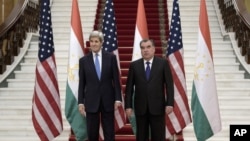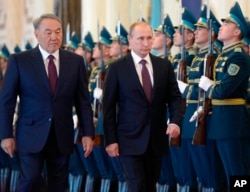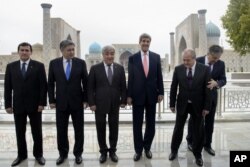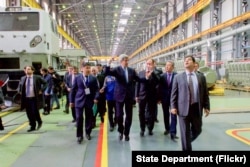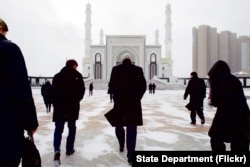U.S. Secretary of State John Kerry is wrapping up the first trip by a top U.S. diplomat to all five Central Asian countries in what Russian analysts say underscores the counterbalance played by Washington in the region.
After meeting with Tajik President Emomali Rahmon in Dushanbe, Kerry noted Tajikistan's unique position in having the longest border with Afghanistan.
"I emphasized the United States' commitment to working with Tajikistan and with other countries in the region to strengthen the border security," he said.
Kerry added he and Rahmon also "discussed President [Barack] Obama’s decision to leave additional troop levels in Afghanistan in order to contribute to regional stability."
But as concerns are raised about resurgent Taliban and the rise of al-Qaida and the Islamic State terrorists in Afghanistan, Kabul is also looking to Russia for more arms to combat extremists.
During an October trip to Kazakhstan, Russian President Vladimir Putin warned of the danger of terrorists entering Central Asia from Afghanistan.
The U.S. operated military bases in Uzbekistan and Kyrgyzstan that those countries closed in 2001 and 2014, respectively, in what was seen as evidence of the region's tilt toward Russia.
But Putin upset countries in the region when he suggested in 2014 that Kazakhstan had little history of independence.
"Of course, a kind of competition between Russia and the United States exists there," said Leonid Gousev, a senior fellow in the Analytical Institute of International Studies of Moscow State Institute of International Relations University. "But the opportunities for cooperation also exist, particularly on security issues."
Importance of region
Gousev said Kerry's trip shows the United States views Central Asia not only in the context of the situation in Afghanistan.
"This is kind of an attempt to counteract the expansion of Russian influence in the former Soviet Union states, particularly in the Central Asian region, that is, the expansion of the Eurasian Economic Union," he said.
During the trip, Kerry promoted the New Silk Road Initiative, linking Central and South Asia in areas of energy, trade and business.
On Sunday, Kerry signed a joint declaration of cooperation with the five Central Asian countries: Kyrgyzstan, Uzbekistan, Kazakhstan, Tajikistan and Turkmenistan.
The declaration covered a wide range of issues discussed during Kerry's meeting with Central Asian foreign ministers, known as the C5+1, in Samarkand.
Playing on rivalry
Arkady Dubnov, a political analyst based in Moscow, said Central Asian countries have become adept at playing on the rivalry between the United States and Russia.
"If Tajikistan, for example, shows openly that the Americans offer them military or any other help or military cooperation, that must make Russia give them more than the Americans, if Russia wants to preserve its influence in Tajikistan," Dubnov said. "That's a primitive, but efficient, mechanism that dominates the policies of the region."
Rights groups urged Kerry to raise human rights issues more vocally as he met with leaders of Central Asia, who are considered to be among the world's worst rights violators.
U.S. officials said rights issues were specifically raised behind closed doors.
But Hugh Williamson, director of Europe and Central Asia at Human Rights Watch, said public statements are needed to support the region's beleaguered rights activists.
"Neither Russia nor China credibly focus on maintaining international human rights standards as set down by the U.N. in their relations with these countries," Williamson said. "In that sense, there is a responsibility on the United States, also European countries as well, to focus on those issues."
During a speech Monday at Kazkhstan's Nazarbaev University, Kerry warned against using terrorism to silence legitimate dissent.
"Terrorism is not an excuse to lock up political opponents, diminish the rights of civil society, or pin a false label on activists who are engaged in peaceful dissent," he told the audience of mainly students. "Practices of this type are not only unjust but they are in the end counterproductive."
'Nonviolent change'
He concluded, “When the pathways to nonviolent change are closed, the road to extremism becomes more inviting.”
Moscow-based analyst Dubnov said China's influence is growing larger as it offers investment without stepping on toes.
"At that, China conducts a wise policy without encroaching on the desire of Moscow to preserve its traditional military-political control in the region," he said. "I am not sure the United States will be able to drastically change this balance."
In an oft-repeated line during his trip, Kerry said Central Asia should become economically integrated without having to choose a single path.
"Today, what we want to see is not a struggle between China and Russia and the United States in a zero-sum game," he said. "What we want to see is a Central Asia that claims its place as an engine of growth at the heart of a modern and dynamic Asia."
Though economic development was a featured topic during Kerry's speeches on the trip, no major economic deals were announced.




